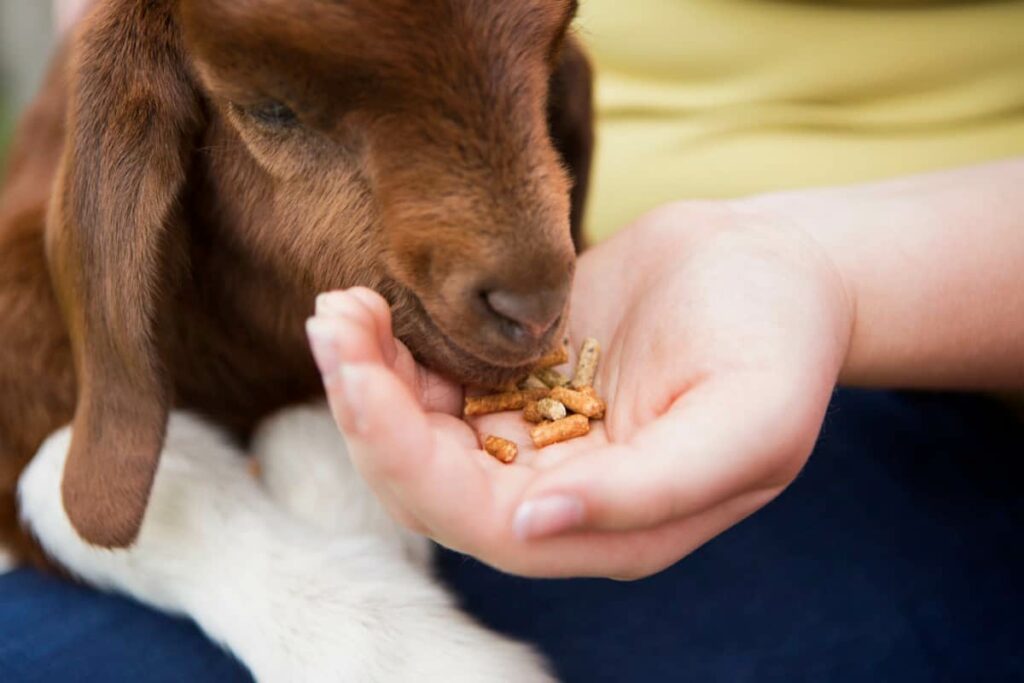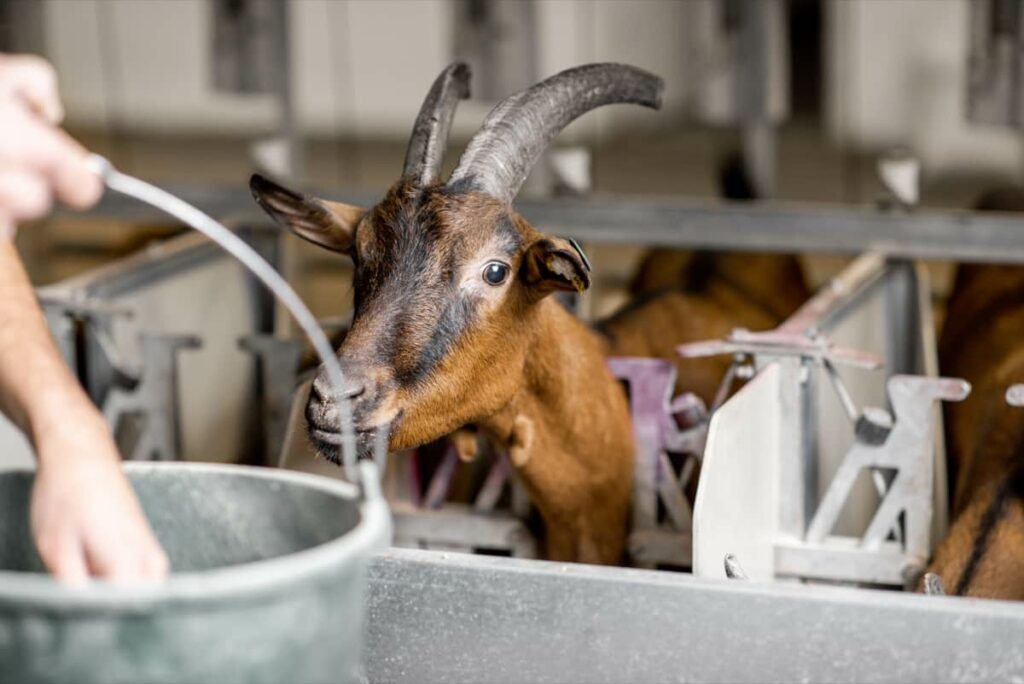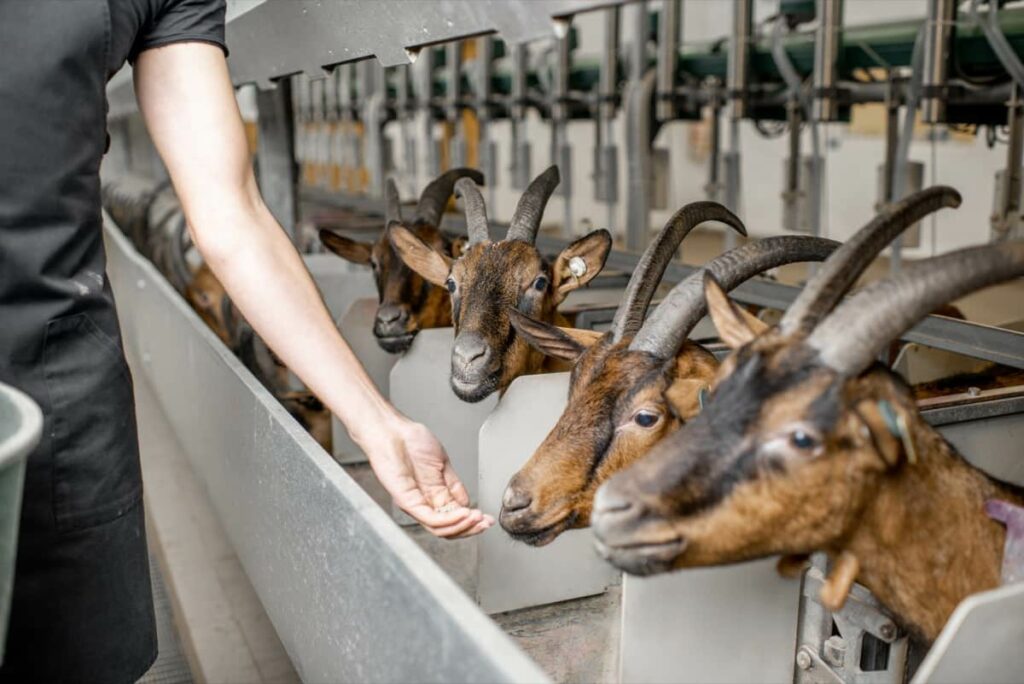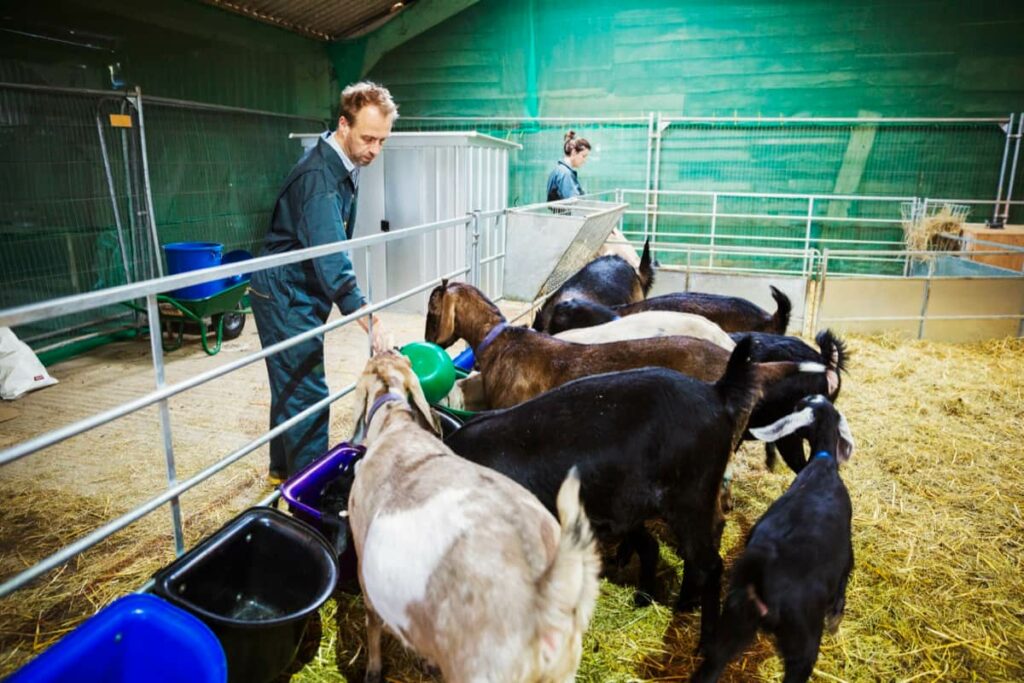Goat feed management refers to the practice of providing goats with a well-balanced and nutritious diet to meet their specific needs. It involves understanding the nutritional requirements of goats at different life stages, creating a balanced diet using various feed sources, and ensuring they have access to fresh water. To maintain good health, goats require adequate amounts of proteins, carbohydrates, fats, vitamins, minerals, and fiber.

How to Feed Goats
Creating a Balanced Diet for Goats: Essential Nutrients and Feed Sources
When it comes to feeding your goats, providing them with a balanced feed is crucial for their overall health and well-being. Just like humans, goats require essential nutrients to thrive and stay healthy. These include carbohydrates, proteins, fats, vitamins, minerals, and water. Each component is vital in maintaining proper bodily functions and promoting growth.
Carbohydrates are the main energy source for goats and can be found in grains such as corn or oats. Proteins are essential for muscle development and can be obtained from legumes or soybean meal sources. Fats provide concentrated energy and can come from vegetable oils or animal fats. Vitamins are necessary for various metabolic processes within the body. Minerals are needed in small quantities but significantly maintain bone health, immune function, reproduction, and more.
Feeding Goats at Different Life Stages: From Kids to Adult Goats
Feeding goats at different life stages requires careful attention to their nutritional needs. Their dietary requirements change as they grow and develop from cute little kids to robust adult goats. When it comes to feeding young goat kids, milk is the primary source of nourishment. They rely on their mother’s milk for the first few weeks of life, which provides them with essential nutrients and antibodies. You can gradually introduce solid foods such as high-quality hay or pasture as they reach about one month old.
Once goats reach adulthood (around a year old), their diet should primarily consist of high-quality roughage like hay or pasture grass. However, it’s important not to neglect to provide them with essential minerals and vitamins through mineral supplements or blocks specifically formulated for goats. Remember that each goat has unique dietary needs based on breed, size, activity level, and overall health. Properly managing the feed intake during different life stages is crucial in maintaining your goats’ health and maximizing productivity.
The Importance of Forage in a Goat’s Diet: Types and Management
Forage is vital in goats’ diet, providing them with essential nutrients, fiber, and energy. Goats are natural browsers and prefer to eat leaves, twigs, and shrubs rather than grass alone. This makes foraging an integral part of their diet. When it comes to types of forage suitable for goats, there is a wide range to choose from. Common options include pasture grasses like Bermuda grass or alfalfa hay. However, they must vary their diet by offering different browse types, such as shrubbery or tree leaves. Managing the availability and quality of forage is crucial.
In case you missed it: Top 6 Goat Farms in India: Biggest and Best

Supplementing Goats’ Diet with Concentrates: Grains, Pellets, and Minerals
Grains such as corn, oats, barley, and wheat can be fed to goats as part of their concentrate ration. They provide energy-rich carbohydrates that help fuel the goat’s daily activities. However, it’s important to remember that grains should never make up most of a goat’s diet. Pelleted feeds formulated specifically for goats are another option when supplementing their diet.
These pellets contain various ingredients like grains, protein sources (such as soybean meal), vitamins, and minerals – all packed into convenient bite-sized pieces. Minerals are also crucial for goats’ overall health and productivity. A mineral supplement designed for goats can help ensure they get these nutrients.
Providing Adequate Water for Goats: Hydration and Water Sources
Goats’ specific water requirements vary depending on temperature, age, body weight, and lactation status. On average, goats require 2-4 gallons of water daily, which can increase during hot weather or when nursing. Natural water sources like streams or ponds may be suitable if the water is free from contaminants. However, it’s important to regularly test these sources for quality and ensure they remain accessible throughout the year.
Feeding Goats in Different Seasons: Adjusting for Temperature and Climate
During hot summer, it’s important to ensure that your goats have access to clean and fresh water. Dehydration can be a serious issue for them. Additionally, providing shade or shelter from direct sunlight will help keep them cool. You may need to adjust the quantity and composition during hotter periods. Goats eat less when overheated, so offering smaller meals throughout the day can be beneficial.
As temperatures drop, goats require extra energy to stay warm. Increasing their calorie intake through higher-quality hay or grains can help meet their increased energy needs. Don’t forget about water. Even in colder weather, your goats must have access to unfrozen water sources. Heated buckets or troughs are practical solutions for preventing freezing.
Preventing Common Feeding Issues in Goats: Bloat, Acidosis, and Overeating Disease
Proper nutrition for your goats is essential for their overall health and well-being. However, improper feeding practices can lead to common issues such as bloat, acidosis, and overeating disease. Understanding these conditions and taking necessary precautions to prevent them is important.
Bloat in goats occurs when gas builds up in a goat’s rumen due to the fermentation of certain feeds. This can be prevented by avoiding sudden changes in diet, providing adequate roughage like hay or pasture grazing, and ensuring access to fresh water at all times. Regular exercise can also help prevent bloat by promoting digestion. Acidosis is another feeding issue that arises from an imbalanced diet or excessive consumption of high-energy feeds like grains.
In case you missed it: Vaccination Schedule for Goats: A Comprehensive Guide for Beginners

To prevent this condition, it’s crucial to gradually introduce new feeds into the goat’s diet and monitor their intake carefully. Overeating disease occurs when goats consume large quantities of grain or other highly palatable feeds too quickly. This condition can be prevented by introducing concentrates slowly into the diet and ensuring that feeders are clean and properly maintained.
Feeding Goats on Pasture: Grazing Management and Rotational Systems
Grazing management involves dividing your pasture into smaller sections or paddocks and periodically moving the goats from one area to another. Rotational grazing allows the vegetation in each paddock to recover before being grazed again, preventing overgrazing and promoting regrowth.
By rotating your goats through different paddocks, you can minimize parasite infestations, as parasites accumulate in specific areas over time. Look for signs of overgrazing or underutilization in certain areas and any potential weeds or poisonous plants that may threaten your goats’ health.
Developing a Feeding Schedule for Goats: Frequency and Quantity of Feedings
Adult goats should be fed twice daily – once in the morning and again in the evening. On the other hand, kids require more frequent feedings due to their smaller stomach capacity. They should be given small meals at regular intervals to support their rapid growth.
The amount of feed your goats need depends on factors like age, weight, activity level, and lactation status (for females). A good rule of thumb is to provide each adult goat with around 2-4% of its body weight in feed per day. It’s important not to overfeed or underfeed your goats, as both can lead to health issues.
Goat Feeding Chart/Table
| Feed Type | Feed source | Benefits |
| Forage | Pasture grasses like Bermuda grass or alfalfa hay | Healthy growth and optimal productivity for your goats |
| Carbohydrate | A diet with concentrates such as grains or pelleted feeds | Provide the majority of energy to goats |
| Proteins | Alfalfa hay or clover, along with soybean meal or cottonseed meal | For muscle development and growth |
| Pelleted feeds | Various ingredients like grains, protein sources (such as soybean meal), vitamins, and minerals | Provide all the necessary nutrients in the right proportions |
| Adequate water | 2-4 gallons of water per day | Optimal animal performance and health |
| Fats | Sources like sunflower seeds or added through oils like corn oil or vegetable oil | Ideal for ensuring maximum health and getting maximum profit |
In case you missed it: Goat Breeding and Genetics for Improved Productivity and Disease Resistance

Conclusion
Goat feed management is vital in keeping these animals healthy and thriving. Creating a balanced diet for goats involves selecting the right combination of feed sources. This can include hay or pasture forage as the primary source of roughage and fiber. Proper feed management is crucial for the health and well-being of goats.
- Types of Grass Growing for Goat Farm
- How to Train Goats for Milking: A Beginners Guide
- Goat Milking Practices and Equipment: A Beginner’s Guide
- Goat Farming for Fiber: Producing Mohair and Cashmere
- Maximizing Goat Milk Production: Tips for Dairy Goat Farmers
- Goat Farming as a Family Business: Strategies for Success
- Profitable Kenya Goat Breeds for Commercial Dairy and Meat Business
- Unlock the Secrets of Oberhasli Goat: Discover Raising and Management Practices
- Ultimate Guide to Myotonic Goats: Explore Profile to Raising
Very vital information